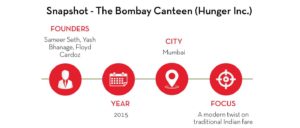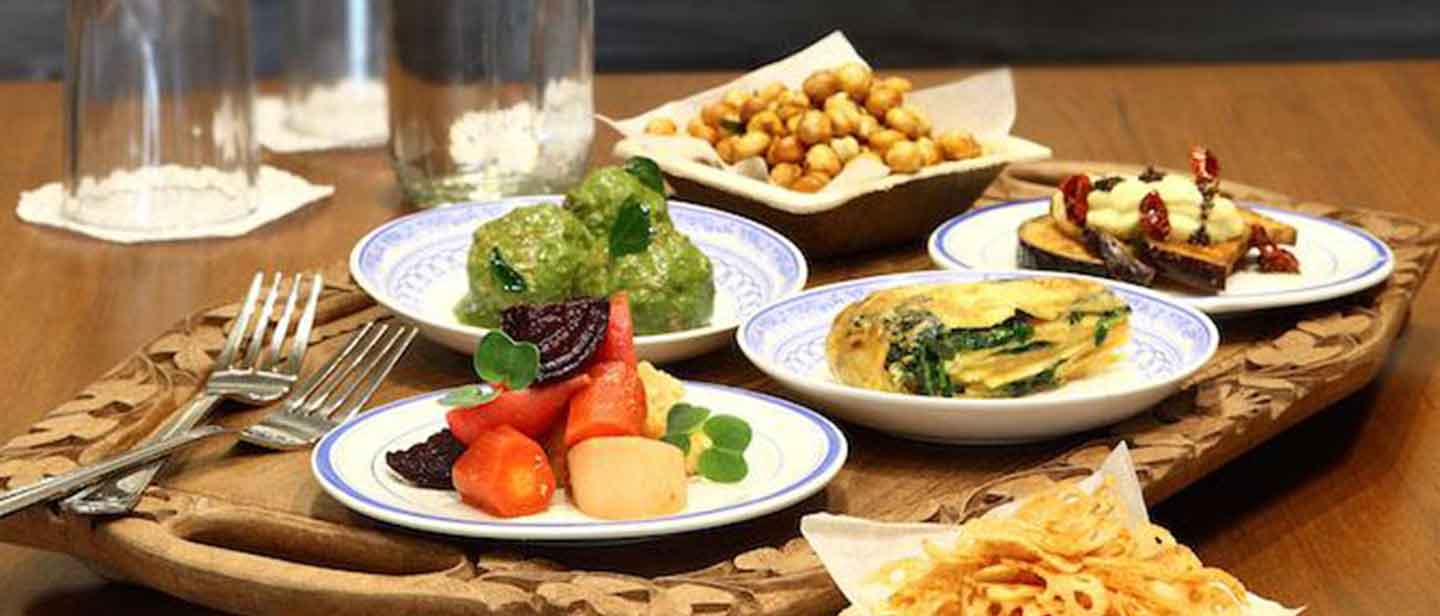With its twist on what’s traditional and its emphasis on sourcing and eating local, The Bombay Canteen has earned a loyal patronage that has helped the restaurant turn profitable in under two years

For Yash Bhanage and Sameer Seth, founding partners at The Bombay Canteen (Hunger Inc.), the idea of setting up a business in the Indian food and beverage space lingered on, despite the two working elsewhere, in the U.S. and Singapore, respectively. In the period between 2012 and 2015, the idea went from germination to careful execution as the duo roped in Top Chef Masters’ winner Floyd Cardoz to establish The Bombay Canteen (TBC) in Lower Parel, Mumbai. The restaurant has several stand out features; an India-inspired menu which puts a twist on the traditional, seasonal changes to the menu based on sourcing the freshest local produce, 4,000 sq. ft of space that is designed to meet varying dining needs, all at a reasonable price point. Little wonder then that its reception has been nothing short of fantastic and in a span of two years, the restaurant which was set up on a capital of a little over Rs. 3 crore, is profitable.
Coming home for more
At TBC, the food is unpretentious and as Seth puts it, “We are constantly in the process of reimagining Indian comfort food.” So, there’s a playful take on some old favourites from the nooks and crannies of India and in bringing these to the table, the founders are very conscious of working with local produce that is fresh. “When we started, all we had access to was cheese from Amul and that’s what we used. Recently, we have begun sourcing locally made cheese from Sikkim and Kashmir,” reveals Seth. The trick with local sourcing is that the produce is seasonal and in keeping with that, TBC’s menu has seen over eight seasonal changes, a first in Indian fine dining.
When you think fine dining, you certainly aren’t expecting hors d’oeuvres at a price point of Rs. 60, but that’s just what the ‘chintus’ or the restaurant’s spin on bar snacks, are priced at. Even the fancy cocktails are attractively priced and that’s as refreshing as it gets. Seth insists it’s the food that keeps people coming back for much more, but the pricing does help the restaurant maintain a repeat percentage of over 45 per cent.
We encourage our staff to understand the stories behind the food being created and tastings are a part of the line up. This helps them translate the same to our guests and the passion for what we do comes through
In the finer details
When TBC first opened doors, it struggled with capturing data and processing the same to its benefit. “When we opened, we took down reservations on Microsoft Excel and the lack of data continuity was one of our biggest pain points. We’ve spent the last two years partnering with technology providers and ironing out our systems and processes to ensure a much better capture of data,” explains Seth. The restaurant was one of the first in Mumbai to adopt Zomato Book (table and reservation model), nine months into operation. It has also recently launched a gifting solution by way of a card called The Canteen Card (with a minimum top up of Rs. 500) that allows guests to redeem their gift card at any meal, any day of the week. Seth shares that as the restaurant grows in patronage, it will make substantial efforts to better its technology but will mostly look to work with partners in this regard.
An area where TBC’s management spends considerable time and effort is in training its staff. In the restaurant business, there exists a line up and typically, in India, the line up is where staff go through a grooming check and are briefed about service for the day. What the founders brought to the line up at TBC is what they had experienced in markets such as New York and Singapore. “We encourage our staff to understand the stories behind the food being created and tastings are a part of the line up. This helps them translate the same to our guests and the passion for what we do comes through. We also get them to use technology to look up guest preferences so our service is seamless,” explains Seth.

At present, TBC is just at one location and the founders believe in a slow yet steady approach to growth. “India is not a homogenous nation and being successful in one geography is no guarantee that the same format will succeed in another,” says Seth. The founding restaurateurs believe that their young company is yet to build the operational and cultural bandwidth to scale to newer geographies. The challenge of building a stable supply chain is work in progress at TBC and the company has hired a partner to better this aspect of its business. “Franchising is not an option for us as we’re not looking to build a template business,” concludes Seth while pressing upon the fact that at The Bombay Canteen, the emotion you feel when it comes to your food is everything.
Insights from The Bombay Canteen
Local Approach: At TBC, sourcing fresh local produce is a top priority. The company has recently hired a partner to better its supply chain and ensure that seasonal produce is highlighted in its menus that change as the seasons do.
Marketing Approach: TBC is very aggressive about its social media driving patronage. Its marketing initiatives are centred around generating interesting content based on the stories behind the food that is created in its kitchen.
Retention Approach: The company takes pride in the fact that since it commenced operations in 2015, its management has stayed on board. It is constantly working on finding newer ways to reward employees and spends a considerable amount of time and effort on training its staff.


